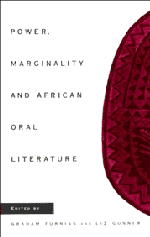Book contents
- Frontmatter
- Contents
- List of contributors
- Preface
- Note on transcription
- 1 Introduction: power, marginality and oral literature
- Part I Orality and the power of the state
- 2 Oral art and contemporary cultural nationalism
- 3 The letter and the law: the politics of orality and literacy in the chiefdoms of the northern Transvaal
- 4 A king is not above insult: the politics of good governance in Nzema avudwene festival songs
- Part II Representing power relations
- Part III Oral forms and the dynamics of power
- Part IV Endorsing or subverting the paradigms: women and oral forms
- Part V Mediators and communicative strategies
- Bibliography
- Index
4 - A king is not above insult: the politics of good governance in Nzema avudwene festival songs
Published online by Cambridge University Press: 18 December 2009
- Frontmatter
- Contents
- List of contributors
- Preface
- Note on transcription
- 1 Introduction: power, marginality and oral literature
- Part I Orality and the power of the state
- 2 Oral art and contemporary cultural nationalism
- 3 The letter and the law: the politics of orality and literacy in the chiefdoms of the northern Transvaal
- 4 A king is not above insult: the politics of good governance in Nzema avudwene festival songs
- Part II Representing power relations
- Part III Oral forms and the dynamics of power
- Part IV Endorsing or subverting the paradigms: women and oral forms
- Part V Mediators and communicative strategies
- Bibliography
- Index
Summary
Avudwene satirical songs are performed in the Nzema annual Kundum festival. The festival is celebrated by the Ahanta and Nzema people of south-west Ghana (Agovi 1979), who occupy a contiguous coastal strip of land from Sekondi-Takoradi to Half-Assini in the Western Region of Ghana. They are members of the Bia language group (Kropp-Dakubu 1988: 50–76) and share the same Kundum festival as a common cultural event.
Since the early seventeenth century when the festival was first recorded in European records (Bosman 1967: 158), writers have always drawn attention to its dominant religious focus and links with other festivals in Ghana (Rattray 1924: 151–5). On the other hand, its singular feature of satirical songs significantly reveals a concern with secular issues. It deals exclusively with historical, political and socio-economic developments in Ahanta—Nzema society. For this essay, the socio-political concerns of the songs have been isolated for analysis.
Several writers have drawn attention to the close relationship between African orature, politics and the traditional state. According to Ruth Finnegan (1970: 82), the patronage of poets in centralised political systems in the past led to the creation of a ‘poetry of profound political significance as a means of political propaganda, pressure or communication’; such poetry includes songs of insult, challenge or satirical comment used as ‘politically effective weapons’ (1970: 172).
- Type
- Chapter
- Information
- Power, Marginality and African Oral Literature , pp. 47 - 62Publisher: Cambridge University PressPrint publication year: 1995
- 7
- Cited by

